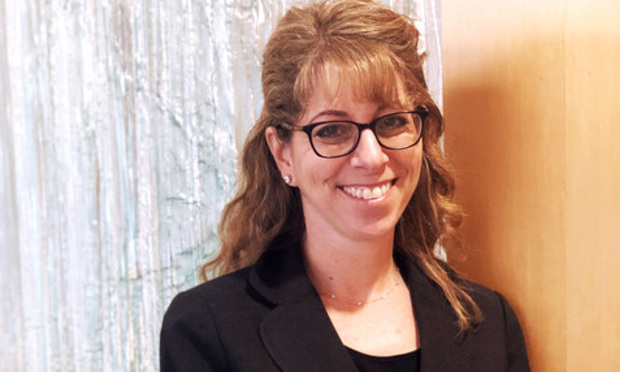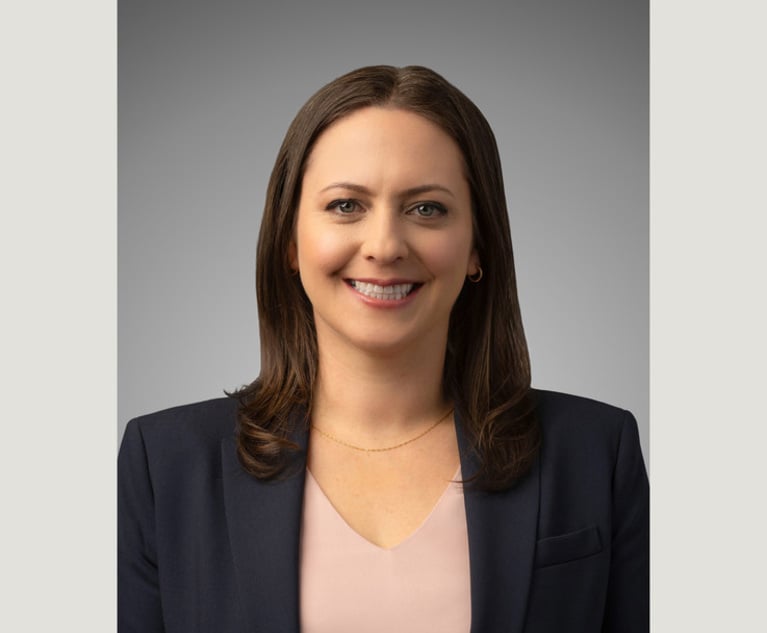Perkins Coie
When you realize a man is innocent, suddenly the stakes go way up. … You realize someone's freedom is on the line…
April 30, 2019 at 11:59 PM
3 minute read
 Leah Medway, with Perkins Coie.
Leah Medway, with Perkins Coie.
Describe your firm's philosophy on pro bono service.
Perkins Coie's commitment to community runs more than 100 years deep. Sharing our time and talents to help those most in need, both on an individual and systemic basis, defines our firm culture.
We encourage our attorneys to pursue their passions, as well as to tackle pressing needs. We provide our pro bono clients with the same extraordinary client service that we offer to our paying clients.
Of the big cases your firm recently worked on, one included representing Eric Blackmon, who had been in prison since 2002 for a murder he did not commit. Tell us more about that case and how you reached the outcome.
The Seventh Circuit appointed Perkins Coie to represent Eric Blackmon in 2015, while we were already before the circuit on another wrongful conviction pro bono case, which we eventually won. At the heart of Blackmon's innocence plea was his trial counsel's failure to call any alibi witnesses. When we won a remand of Blackmon's case in 2016, we pulled in the resources of Northwestern University's Center on Wrongful Convictions to contact alibi witnesses and get the best representation for his evidentiary hearing. With a parade of alibi witnesses each testifying to Blackmon's innocence, we were able to convince the same judge who previously denied Blackmon's petition for a habeas corpus writ to grant the petition, which led to his release.
What was the most satisfying aspect of that key case?
Seeing an innocent man released from prison and all charges dropped was deeply satisfying. From the beginning, we believed in Blackmon's innocence. When you realize a man is innocent, suddenly the stakes go way up. You're no longer making an argument to make a legal point—you realize that someone's freedom is on the line and it's up to you and your team to get him across the finish line.
Discuss other key pro bono matters recently completed by the firm.
In the aftermath of the June 2018 Matter of A-B- decision issued by then-U.S. Attorney General Jeff Sessions, which threatened the viability of claims for asylum based on domestic, gang and other private violence, our pro bono teams adapted and prevailed in many challenging immigration cases.
In one, we obtained withholding of removal status for a Honduran national and mother of two fleeing domestic violence and threats to her life. In another, we helped a Guatemalan/Salvadoran mother and her two daughters win reinstatement and asylum. Before fleeing to the U.S., the mother and older daughter had suffered severe domestic violence in Guatemala, then fled to El Salvador where the older daughter received death threats from the MS-13 gang.
Why does your pro bono work matter to you as a lawyer?
Many of those who most need a lawyer cannot afford one. By devoting time to pro bono work, I can use my skills to offer a lifeline to someone in need. It is my way of giving back and it is incredibly rewarding. I also love helping Big Law harness the collective power of pro bono, positively impacting lives and improving the legal system.
Responses submitted by Leah Medway, firmwide pro bono counsel at Perkins Coie.
This content has been archived. It is available through our partners, LexisNexis® and Bloomberg Law.
To view this content, please continue to their sites.
Not a Lexis Subscriber?
Subscribe Now
Not a Bloomberg Law Subscriber?
Subscribe Now
NOT FOR REPRINT
© 2025 ALM Global, LLC, All Rights Reserved. Request academic re-use from www.copyright.com. All other uses, submit a request to [email protected]. For more information visit Asset & Logo Licensing.
You Might Like
View All
Veteran Federal Trade Law Enforcer Joins King & Spalding In Washington
4 minute read
Big Law Practice Leaders Gearing Up for State AG Litigation Under Trump
4 minute read
Weil Lures DOJ Antitrust Lawyer, As Government Lateral Moves Pick Up Before Inauguration Day
5 minute read
Lawyers Share Concerns, Predictions Over How Bondi’s Loyalism to Trump May Impact DOJ
6 minute readTrending Stories
Who Got The Work
J. Brugh Lower of Gibbons has entered an appearance for industrial equipment supplier Devco Corporation in a pending trademark infringement lawsuit. The suit, accusing the defendant of selling knock-off Graco products, was filed Dec. 18 in New Jersey District Court by Rivkin Radler on behalf of Graco Inc. and Graco Minnesota. The case, assigned to U.S. District Judge Zahid N. Quraishi, is 3:24-cv-11294, Graco Inc. et al v. Devco Corporation.
Who Got The Work
Rebecca Maller-Stein and Kent A. Yalowitz of Arnold & Porter Kaye Scholer have entered their appearances for Hanaco Venture Capital and its executives, Lior Prosor and David Frankel, in a pending securities lawsuit. The action, filed on Dec. 24 in New York Southern District Court by Zell, Aron & Co. on behalf of Goldeneye Advisors, accuses the defendants of negligently and fraudulently managing the plaintiff's $1 million investment. The case, assigned to U.S. District Judge Vernon S. Broderick, is 1:24-cv-09918, Goldeneye Advisors, LLC v. Hanaco Venture Capital, Ltd. et al.
Who Got The Work
Attorneys from A&O Shearman has stepped in as defense counsel for Toronto-Dominion Bank and other defendants in a pending securities class action. The suit, filed Dec. 11 in New York Southern District Court by Bleichmar Fonti & Auld, accuses the defendants of concealing the bank's 'pervasive' deficiencies in regards to its compliance with the Bank Secrecy Act and the quality of its anti-money laundering controls. The case, assigned to U.S. District Judge Arun Subramanian, is 1:24-cv-09445, Gonzalez v. The Toronto-Dominion Bank et al.
Who Got The Work
Crown Castle International, a Pennsylvania company providing shared communications infrastructure, has turned to Luke D. Wolf of Gordon Rees Scully Mansukhani to fend off a pending breach-of-contract lawsuit. The court action, filed Nov. 25 in Michigan Eastern District Court by Hooper Hathaway PC on behalf of The Town Residences LLC, accuses Crown Castle of failing to transfer approximately $30,000 in utility payments from T-Mobile in breach of a roof-top lease and assignment agreement. The case, assigned to U.S. District Judge Susan K. Declercq, is 2:24-cv-13131, The Town Residences LLC v. T-Mobile US, Inc. et al.
Who Got The Work
Wilfred P. Coronato and Daniel M. Schwartz of McCarter & English have stepped in as defense counsel to Electrolux Home Products Inc. in a pending product liability lawsuit. The court action, filed Nov. 26 in New York Eastern District Court by Poulos Lopiccolo PC and Nagel Rice LLP on behalf of David Stern, alleges that the defendant's refrigerators’ drawers and shelving repeatedly break and fall apart within months after purchase. The case, assigned to U.S. District Judge Joan M. Azrack, is 2:24-cv-08204, Stern v. Electrolux Home Products, Inc.
Featured Firms
Law Offices of Gary Martin Hays & Associates, P.C.
(470) 294-1674
Law Offices of Mark E. Salomone
(857) 444-6468
Smith & Hassler
(713) 739-1250










